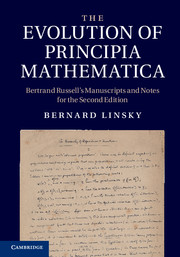 The Evolution of Principia Mathematica
The Evolution of Principia Mathematica Book contents
- Frontmatter
- Contents
- 1 Introduction
- 2 Writing the second edition
- 3 Logic since the first edition
- 4 Notation and logic
- 5 Improvements in the new edition
- 6 Induction and types in Appendix B
- 7 The reception of the second edition
- 8 The list of definitions for Carnap
- Introduction to the second edition
- Appendix A
- Appendix B
- Appendix C
- Hierarchy of propositions and functions
- Amended list of propositions: notes
- Bibliography
- Index
- Plate section
5 - Improvements in the new edition
Published online by Cambridge University Press: 05 August 2011
- Frontmatter
- Contents
- 1 Introduction
- 2 Writing the second edition
- 3 Logic since the first edition
- 4 Notation and logic
- 5 Improvements in the new edition
- 6 Induction and types in Appendix B
- 7 The reception of the second edition
- 8 The list of definitions for Carnap
- Introduction to the second edition
- Appendix A
- Appendix B
- Appendix C
- Hierarchy of propositions and functions
- Amended list of propositions: notes
- Bibliography
- Index
- Plate section
Summary
Russell begins the Introduction to the second edition by writing that the body of the text has not been changed for the new edition because any new propositions would disrupt the elaborate system of numbered theorems. Changes, he says, will be proposed in the Introduction, but not worked into the system. Appendix A does have a number (✻8), and numbered theorems, but the other changes are not formulated so technically. Thus even the definitions of the standard connectives in terms of the Sheffer stroke remain unnumbered. More serious for the reader, however, is the lack of precision in the discussion of extensionality and the abandonment of the axiom of reducibility. The informal approach to the discussion of the changes leaves it unclear which are minor, and which central, and for all, exactly what is being proposed. Following the opening excuse for not modifying the technical body of the work, Russell goes on to present a seemingly disjointed list of changes which are “desirable”, beginning with what he describes as “the most definite improvement resulting from work in mathematical logic during the past fourteen years…”. This improvement turns out to be the reduction of the propositional connectives to one, the Sheffer stroke “p|q” for “not both p and q.” It is true that the foundation for the logic circuits of contemporary computer chips is the thousands of connections executing operations on current that model this very stroke, now called the “nand” connective, so, in a way, this use of the Sheffer stroke in “logic” is the greatest legacy of the second edition of PM.
Information
- Type
- Chapter
- Information
- The Evolution of Principia MathematicaBertrand Russell's Manuscripts and Notes for the Second Edition, pp. 108 - 137Publisher: Cambridge University PressPrint publication year: 2011